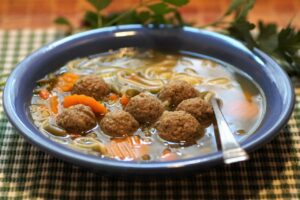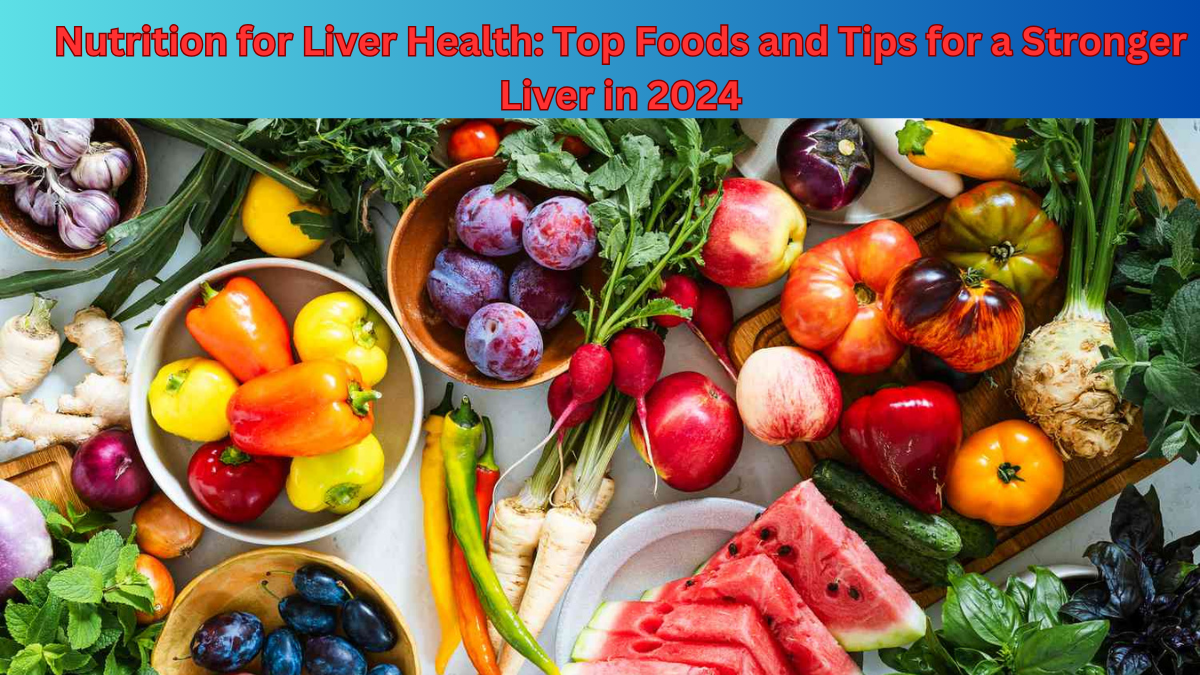Meta Description
Discover the best nutrition tips for liver health! Learn about liver-friendly foods, essential nutrients, and lifestyle changes to support liver function and detox naturally in 2024.
Introduction
Your liver works tirelessly to keep your body healthy—detoxifying, metabolizing, and more. But are you giving it the care it deserves? With liver diseases on the rise, adopting a liver-friendly diet is more important than ever. The good news? You can significantly improve liver function through the right nutrition! In this guide, we’ll dive into the best foods, nutrients, and lifestyle habits for optimal liver health. Ready to give your liver the love it needs? Let’s get started!
Main Headings
1. Why Liver Health Matters
- The liver’s role in detoxification, metabolism, and nutrient storage
- Common signs of poor liver health
- Long-term impacts of neglecting liver care
2. Foods That Support Liver Health
- Leafy greens: Spinach, kale, and arugula to combat oxidative stress
- Cruciferous vegetables: Broccoli and cauliflower for detox support
- Citrus fruits: Lemons and oranges for Vitamin C boost
- Fatty fish: Omega-3-rich salmon and mackerel
- Garlic and onions: Natural compounds aiding detox pathways
3. Nutrients Essential for Liver Function
- Antioxidants: Vitamin E, Vitamin C, and glutathione
- Fiber: For better digestion and toxin removal
- Healthy fats: Omega-3 fatty acids to reduce inflammation
- B vitamins: For energy metabolism and liver enzyme function
4. Foods and Habits to Avoid
- Processed foods: High-fructose corn syrup and trans fats
- Excess alcohol: Its impact on liver disease risk
- Over-the-counter medications: Acetaminophen and liver toxicity risks
- Sugar and refined carbs: Fatty liver disease connection
5. Lifestyle Changes for Liver Health
- Hydration: The role of water in liver detoxification
- Regular exercise: How physical activity enhances liver function
- Adequate sleep: Liver regeneration during rest
- Stress management: Cortisol’s impact on liver health
6. Supplements for Liver Health: Do You Need Them?
- Common supplements: Milk thistle, turmeric, NAC
- Potential risks of over-supplementing
- Consulting a healthcare professional

1. Why Liver Health Matters
The liver is a powerhouse organ, performing essential functions that keep your body running smoothly. Let’s explore why liver health is so vital:
The Liver’s Role in Detoxification, Metabolism, and Nutrient Storage
- Detoxification: The liver filters harmful substances, such as alcohol, medications, and toxins, neutralizing them to protect your body.
- Metabolism: It processes fats, carbohydrates, and proteins, converting them into energy and essential compounds like cholesterol and glucose.
- Nutrient Storage: The liver stores vital vitamins (like A, D, E, and K) and minerals (iron and copper) for future use.
- Bile Production: It creates bile, crucial for digesting fats and absorbing fat-soluble vitamins.
Common Signs of Poor Liver Health
- Persistent fatigue and low energy levels
- Jaundice (yellowing of skin and eyes)
- Abdominal pain or swelling
- Dark urine or pale stools
- Unexplained weight loss
- Nausea, loss of appetite, or digestive issues
- Itchy skin or bruising easily
These symptoms often indicate underlying issues, such as fatty liver disease, hepatitis, or cirrhosis, which require immediate attention.
Long-Term Impacts of Neglecting Liver Care
- Chronic Liver Disease: Neglected liver health can lead to conditions like non-alcoholic fatty liver disease (NAFLD) or alcoholic liver disease (ALD).
- Liver Cirrhosis: Over time, scarring (fibrosis) can disrupt liver function, leading to irreversible damage.
- Liver Cancer: Poor liver health significantly increases the risk of developing hepatocellular carcinoma.
- Systemic Health Issues: Since the liver affects blood detoxification, poor liver health can cause systemic inflammation, hormonal imbalances, and weakened immunity.

2. Foods That Support Liver Health
The foods you eat play a pivotal role in supporting liver function. Incorporating these nutrient-dense, liver-friendly foods can enhance detoxification, reduce inflammation, and promote overall health.
Leafy Greens: Spinach, Kale, and Arugula to Combat Oxidative Stress
- Packed with antioxidants like glutathione, these greens help neutralize free radicals that can damage liver cells.
- High in chlorophyll, they assist in detoxifying heavy metals and pesticides from the body.
- Easy to include: Add spinach to smoothies, kale to salads, or arugula as a garnish.
Cruciferous Vegetables: Broccoli and Cauliflower for Detox Support
- Rich in sulforaphane, a compound that boosts the liver’s detox enzymes.
- High in fiber, aiding digestion and reducing the liver’s workload.
- Try steaming, roasting, or stir-frying broccoli and cauliflower to maximize their benefits.
Citrus Fruits: Lemons and Oranges for a Vitamin C Boost
- Loaded with Vitamin C, which supports glutathione production—a key antioxidant for liver detoxification.
- Citrus also enhances hydration and stimulates bile production for better fat digestion.
- Start your day with lemon water or enjoy fresh oranges as a snack.
Fatty Fish: Omega-3 Rich Salmon and Mackerel
- A great source of omega-3 fatty acids, which reduce liver inflammation and prevent fat buildup.
- Helps balance omega-6 fatty acids, which, in excess, can cause inflammation.
- Aim for two servings of fatty fish per week, prepared by grilling, baking, or steaming.
Garlic and Onions: Natural Compounds Aiding Detox Pathways
- Contains allicin, a sulfur compound that supports the liver’s detoxification process.
- Help activate enzymes that flush out toxins from the liver.
- Use raw or lightly cooked garlic and onions in soups, stir-fries, or dressings for maximum benefits.

3. Nutrients Essential for Liver Function
A healthy liver relies on specific nutrients to perform its vital roles in detoxification, metabolism, and regeneration. Let’s explore these key nutrients and their contributions to liver health.
Antioxidants: Vitamin E, Vitamin C, and Glutathione
- Vitamin E: A fat-soluble antioxidant that protects liver cells from oxidative damage caused by toxins and free radicals. Found in nuts, seeds, and spinach.
- Vitamin C: Boosts immune function and aids in the production of glutathione, a powerful antioxidant. Sources include citrus fruits, bell peppers, and strawberries.
- Glutathione: Known as the “master antioxidant,” it plays a direct role in neutralizing harmful substances in the liver. Foods like asparagus, avocado, and whey protein help boost glutathione levels.
Fiber: For Better Digestion and Toxin Removal
- Dietary fiber binds to toxins and bile acids in the digestive tract, reducing the liver’s workload by facilitating their removal.
- Supports gut health, which indirectly impacts liver function by lowering inflammation.
- Found in whole grains, legumes, fruits, and vegetables like broccoli and artichokes.
Healthy Fats: Omega-3 Fatty Acids to Reduce Inflammation
- Omega-3 fatty acids help balance the liver’s fat composition, reducing triglyceride levels and inflammation.
- They also prevent the buildup of fat in the liver, reducing the risk of non-alcoholic fatty liver disease (NAFLD).
- Sources include fatty fish (salmon, sardines), walnuts, chia seeds, and flaxseeds.
B Vitamins: For Energy Metabolism and Liver Enzyme Function
- Vitamin B12, B6, and Folate are essential for energy production and maintaining the liver’s metabolic pathways.
- They support the creation of liver enzymes, which are vital for detoxification.
- Found in eggs, lean meats, leafy greens, and fortified cereals.
4. Foods and Habits to Avoid
Certain foods and lifestyle habits can overload the liver, leading to inflammation, fat accumulation, and long-term damage. Avoiding or limiting these can significantly support liver health.
Processed Foods: High-Fructose Corn Syrup and Trans Fats
- High-Fructose Corn Syrup: Found in sodas, packaged snacks, and sweetened foods, it promotes fat buildup in the liver, increasing the risk of non-alcoholic fatty liver disease (NAFLD).
- Trans Fats: Common in fried and processed foods, trans fats contribute to inflammation and raise bad cholesterol levels, worsening liver health.
- Limit processed and packaged foods and opt for fresh, whole ingredients whenever possible.
Excess Alcohol: Its Impact on Liver Disease Risk
- Alcohol is metabolized in the liver, producing toxic byproducts like acetaldehyde, which can damage liver cells.
- Chronic alcohol consumption leads to conditions like alcoholic fatty liver, hepatitis, and cirrhosis.
- Practice moderation: The general guideline is up to one drink per day for women and two for men, but abstinence is ideal for those with existing liver conditions.
Over-the-Counter Medications: Acetaminophen and Liver Toxicity Risks
- Medications like acetaminophen (Tylenol) can cause severe liver damage when taken in high doses or combined with alcohol.
- Avoid exceeding the recommended dose of any medication, and consult a healthcare provider if you take medications long-term.
- Check labels for hidden acetaminophen in combination medications to prevent unintentional overdoses.
Sugar and Refined Carbs: Fatty Liver Disease Connection
- Excessive intake of sugar and refined carbohydrates (e.g., white bread, pastries, sugary drinks) is converted into fat by the liver, leading to insulin resistance and fatty liver disease.
- High-sugar diets also contribute to systemic inflammation, worsening liver function.
- Replace sugary snacks with fresh fruits and choose whole grains over refined carbs for sustained energy and better liver health.

5. Lifestyle Changes for Liver Health
Adopting healthy lifestyle habits can significantly enhance liver function and overall well-being. These changes support the liver’s detoxification, regeneration, and ability to manage metabolic demands.
Hydration: The Role of Water in Liver Detoxification
- The liver relies on adequate hydration to produce bile and flush out toxins efficiently.
- Dehydration slows down liver function, making it harder to filter waste products.
- Aim to drink at least 8–10 glasses of water daily, and consider adding lemon for a Vitamin C boost.
Regular Exercise: How Physical Activity Enhances Liver Function
- Exercise improves circulation, ensuring that the liver gets the oxygen and nutrients it needs to function optimally.
- Helps reduce fat buildup in the liver, lowering the risk of non-alcoholic fatty liver disease (NAFLD).
- Reduces inflammation and boosts insulin sensitivity, both critical for liver health.
- Incorporate 30–60 minutes of moderate-intensity exercise, like walking, cycling, or swimming, into your routine at least 5 times a week.
Adequate Sleep: Liver Regeneration During Rest
- The liver undergoes key repair and regeneration processes while you sleep, clearing toxins accumulated during the day.
- Poor sleep disrupts the liver’s natural circadian rhythms, impairing its detoxification efficiency.
- Aim for 7–9 hours of quality sleep per night, and establish a consistent sleep schedule.
Stress Management: Cortisol’s Impact on Liver Health
- Chronic stress leads to elevated cortisol levels, which can impair liver function and contribute to fat accumulation.
- Stress also promotes unhealthy coping mechanisms, like overeating or alcohol consumption, which strain the liver further.
- Practice stress-relief techniques such as:
- Mindfulness meditation
- Yoga or gentle exercise
- Deep-breathing exercises
- Creative hobbies like painting or journaling

6. Supplements for Liver Health: Do You Need Them?
Supplements can play a supportive role in liver health by providing additional nutrients or compounds that aid detoxification and regeneration. However, they should be used wisely and under professional guidance.
Common Supplements: Milk Thistle, Turmeric, NAC
- Milk Thistle (Silymarin)
- Known for its antioxidant and anti-inflammatory properties, milk thistle may help protect liver cells and promote regeneration.
- Commonly used to support the liver in conditions like fatty liver, hepatitis, and cirrhosis.
- Turmeric (Curcumin)
- The active compound curcumin is a potent anti-inflammatory that helps reduce oxidative stress in the liver.
- Turmeric also boosts bile production, aiding digestion and toxin elimination.
- N-acetylcysteine (NAC)
- A precursor to glutathione, the body’s master antioxidant, NAC helps detoxify the liver and reduce damage from toxins like alcohol and medications.
- Commonly used in cases of acetaminophen overdose or chronic liver stress.
Potential Risks of Over-Supplementing
- Excessive or inappropriate use of supplements can strain the liver instead of helping it.
- High doses of certain supplements, such as Vitamin A, Vitamin E, or iron, can be toxic to the liver.
- Herbal supplements may interact with medications, leading to unintended side effects.
Consulting a Healthcare Professional
- Always consult a healthcare provider or nutritionist before starting any liver health supplements, especially if you have pre-existing conditions or take medications.
- A professional can recommend the right type, dose, and duration based on your specific needs and health goals.
- Focus on a nutrient-rich diet as the primary way to support liver health, using supplements only as an adjunct.
FAQ: Nutrition for Liver Health – Top Foods and Tips for a Stronger Liver in 2024
1. Why is liver health important?
The liver performs critical functions, such as detoxifying harmful substances, metabolizing nutrients, and storing essential vitamins and minerals. A healthy liver is vital for energy production, digestion, and overall well-being.
2. What are the best foods to eat for liver health?
- Leafy Greens: Spinach, kale, and arugula help combat oxidative stress.
- Cruciferous Vegetables: Broccoli and cauliflower support detoxification.
- Citrus Fruits: Lemons and oranges boost Vitamin C levels.
- Fatty Fish: Omega-3-rich salmon and mackerel reduce inflammation.
- Garlic and Onions: Natural compounds support detox pathways.
3. Which nutrients are essential for liver function?
Key nutrients include:
- Antioxidants: Vitamin E, Vitamin C, and glutathione for detox and protection.
- Fiber: Aids digestion and toxin removal.
- Omega-3 Fatty Acids: Reduce inflammation and prevent fat buildup.
- B Vitamins: Support energy metabolism and liver enzyme function.
4. What foods and habits should I avoid for liver health?
- Processed Foods: High in trans fats and high-fructose corn syrup, which lead to fat accumulation in the liver.
- Excess Alcohol: Increases the risk of liver disease.
- Sugar and Refined Carbs: Linked to fatty liver disease.
- Over-the-Counter Medications: Overuse of acetaminophen can harm the liver.
5. How does hydration benefit the liver?
Drinking enough water aids the liver’s detoxification process by flushing out toxins and supporting bile production. Aim for 8–10 glasses of water daily for optimal liver function.
6. Can exercise improve liver health?
Yes! Regular physical activity reduces fat buildup in the liver, enhances circulation, and lowers inflammation. Aim for 30–60 minutes of moderate exercise, such as walking or cycling, most days of the week.
7. What role does sleep play in liver health?
The liver regenerates and performs crucial detoxification processes during sleep. Poor sleep disrupts these functions, so aim for 7–9 hours of quality rest each night.
8. Are supplements necessary for liver health?
Supplements like milk thistle, turmeric, and N-acetylcysteine (NAC) can support liver health but are not mandatory. They should be used under professional guidance to avoid potential risks and interactions with medications.
9. How can stress impact liver health?
Chronic stress raises cortisol levels, which can impair liver function and increase fat accumulation. Managing stress with mindfulness, yoga, or hobbies can benefit your liver and overall health.
10. What are some warning signs of poor liver health?
Signs include:
- Fatigue and low energy
- Jaundice (yellowing of the skin and eyes)
- Abdominal pain or swelling
- Dark urine or pale stools
- Digestive issues like nausea or loss of appetite
If you experience these symptoms, consult a healthcare provider promptly.
11. Can fatty liver disease be reversed?
Yes, early-stage fatty liver disease can often be reversed with:
- A healthy, balanced diet.
- Regular physical activity.
- Reducing alcohol consumption.
- Managing underlying conditions like diabetes or obesity.
12. What are quick tips for improving liver health in 2024?
- Prioritize whole, nutrient-rich foods.
- Stay hydrated and limit processed foods.
- Exercise regularly and get adequate sleep.
- Practice stress management techniques.
- Limit alcohol and unnecessary medications.
List of Semantic Keywords
- Liver-friendly foods
- Liver detox diet
- Fatty liver prevention
- Foods for liver repair
- Natural liver detox
- Antioxidants for liver health
- Best foods for liver
- Foods to cleanse the liver
- Omega-3 for liver
- Healthy liver diet
- Liver function improvement
- Signs of liver damage
- Liver-friendly recipes
- Vitamin C for liver
- Hydration and liver health
- Liver detox tea
- Exercise for liver health
- Milk thistle benefits
- Turmeric for liver
- Garlic for detox
- Liver regeneration foods
- Nutrition for fatty liver
- Alcohol and liver health
- Sleep and liver function
- Liver supplements
- Healthy fats for liver
- Detoxifying foods
- Fiber and liver health
- Liver inflammation foods
- Foods for liver repair
- Liver enzyme health
- Avoiding fatty liver
- Sugar and liver function
- Nutritional liver support
- Best drinks for liver
- Natural remedies for liver
- Diet for cirrhosis
- Liver detox smoothie
- Essential nutrients for liver
- Liver health lifestyle
- Liver support supplements
- Stress and liver health
- Role of Vitamin E
- Fatty liver reversal diet
- Best protein for liver
- Avoiding liver toxins
- Processed foods impact on liver
- Liver function recovery
- Liver care tips
Conclusion
Your liver deserves your attention—it’s the unsung hero of your body. By making simple dietary and lifestyle changes, you can significantly boost your liver’s health and functionality. Start small: swap unhealthy snacks for liver-friendly foods, stay hydrated, and prioritize exercise. Your future self will thank you! Take charge today and enjoy the long-term benefits of a stronger, healthier liver.


Leave a Reply